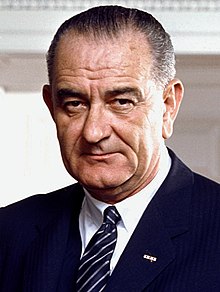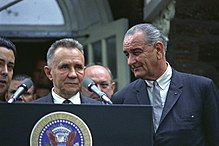Foreign policy of the Lyndon B. Johnson administration
He continued Kennedy's Alliance for Progress policies in Latin America and successfully pressured Israel to accept a cease fire in the Six-Day War.
President Lyndon B. Johnson's key foreign policy advisors were Dean Rusk, George Ball, McGeorge Bundy, Walt Rostow, Robert McNamara and Clark Clifford.
was what he seemed at the time: a president ill at ease in foreign policy who chose to rely on the judgment of the Kennedy team he inherited....When his advisers disagreed, would try to split the difference between them.
Historian Jonathan Colman says that was because Vietnam dominated the attention; the USSR was gaining military parity; Washington's allies more becoming more independent (e.g. France) or were getting weaker (Britain); and the American economy was unable to meet Johnson's demands that it supply both guns and butter.
[5] Though actively engaged in containment in Southeast Asia, the Middle East, and Latin America, Johnson made it a priority to seek arms control deals with Moscow.
Under President Dwight D. Eisenhower, who followed the containment policy of stopping the spread of Communism in Southeast Asia, the United States replaced France as the key patron of South Vietnam.
[13] He feared that the fall of Vietnam would hurt the Democratic Party's credibility on national security issues,[14][15] and he also wanted to carry on what he saw as Kennedy's policies.
Even though President Johnson had very much wanted to keep discussions about Vietnam out of the 1964 election campaign, he thought forced to respond to the supposed aggression by the Vietnamese; as a result, he sought and obtained from the Congress the Gulf of Tonkin Resolution on August 7.
The president later in the campaign expressed assurance that the primary U.S. goal remained the preservation of South Vietnamese independence through material and advice, as opposed to any U.S. offensive posture.
[22] In late-July, U.S. Defense Secretary Robert McNamara proposed to increase the number of U.S. soldiers in Vietnam from 75,000 to over 200,000 in order to convince North Vietnamese leader Ho Chi Minh to seek a negotiated peace.
[23] After consulting with his principals, Johnson, desirous of a low profile, chose to announce at a press conference an increase to 125,000 troops, with additional forces to be sent later upon request.
[27] Throughout 1965, few members of the United States Congress or the administration openly criticized Johnson's handling of the war, though some, like George Ball, warned against expanding the U.S. presence in Vietnam.
"[31] By late-1966, multiple sources began to report progress was being made against the North Vietnamese logistics and infrastructure; Johnson was urged from every corner to begin peace discussions.
Westmoreland and McNamara then recommended a concerted program to promote pacification; Johnson formally placed this effort under military control in October.
[33] By late-1966, it was clear that the air campaign and the pacification effort had both been ineffectual, and Johnson agreed to McNamara's new recommendation to add 70,000 troops in 1967 to the 400,000 previously committed.
[37] In August, Johnson, with the Joint Chiefs of Staff's support, decided to expand the air campaign and exempted only Hanoi, Haiphong and a buffer zone with China from the target list.
[39] With the war arguably in a stalemate and in light of the widespread disapproval of the conflict, Johnson convened a group of veteran government foreign policy experts, informally known as "the Wise Men": Dean Acheson, Gen. Omar Bradley, George Ball, McGeorge Bundy, Arthur Dean, C. Douglas Dillon, Abe Fortas, W. Averell Harriman, Henry Cabot Lodge Jr., Robert D. Murphy, and Maxwell D.
"[41] Afterward, on November 17, in a nationally televised address, the president assured the American public, "We are inflicting greater losses than we're taking...We are making progress."
He joined a growing list of Johnson's top aides who resigned over the war, including Bill Moyers, McGeorge Bundy, and George Ball.
[44] The Tet Offensive convinced senior leaders of the Johnson administration, including the "Wise Men" and new Defense Secretary Clark Clifford, that further escalation of troop levels would not help bring an end to the war.
Johnson was initially reluctant to follow this advice, but ultimately agreed to allow a partial bombing halt and to signal his willingness to engage in peace talks.
[49] In October 1968, when the parties came close to an agreement on a bombing halt, Republican presidential nominee Richard Nixon intervened with the South Vietnamese, promising better terms so as to delay a settlement on the issue until after the election.
[50] Johnson sought a continuation of talks after the 1968 United States elections, but the North Vietnamese argued about procedural matters until after Nixon took office.
High priorities were to minimize Soviet influence, guarantee the flow of oil to the U.S., and protecting Israel and solidifying support from the American Jewish community.
[56][57] In November 1968 Johnson agreed to sell 50 F-4 Phantom II aircraft to Israel, together with munitions, parts, maintenance equipment and requisite mechanical and pilot training.
[63] Harold Wilson, the British Prime Minister from 1964 to 1970, believed in a strong "Special Relationship" with the United States and wanted to highlight his dealings with the White House to strengthen his own prestige as a statesman.
[68] This perceived slight generated much criticism against the president, both in the U.K. and in the U.S.[69][70] As the economies of Western Europe recovered, European leaders increasingly sought to recast the alliance as a partnership of equals.
He ended the traditional American division of South Asia into 'allies' and 'neutrals' and sought to develop good relations with both India and Pakistan by supplying arms and money to both while maintaining neutrality in their intense border feuds.
[72] Johnson also started to cultivate warm personal relations with Prime Minister Lal Bahadur Shastri of India and President Ayub Khan of Pakistan.
The President began the trip by going to the memorial service for Australian Prime Minister Harold Holt, who had disappeared in a swimming accident and was presumed drowned.







